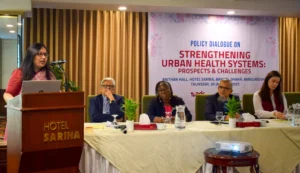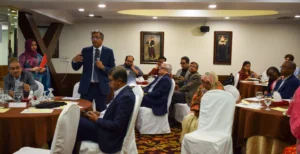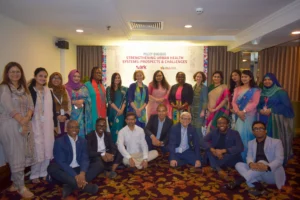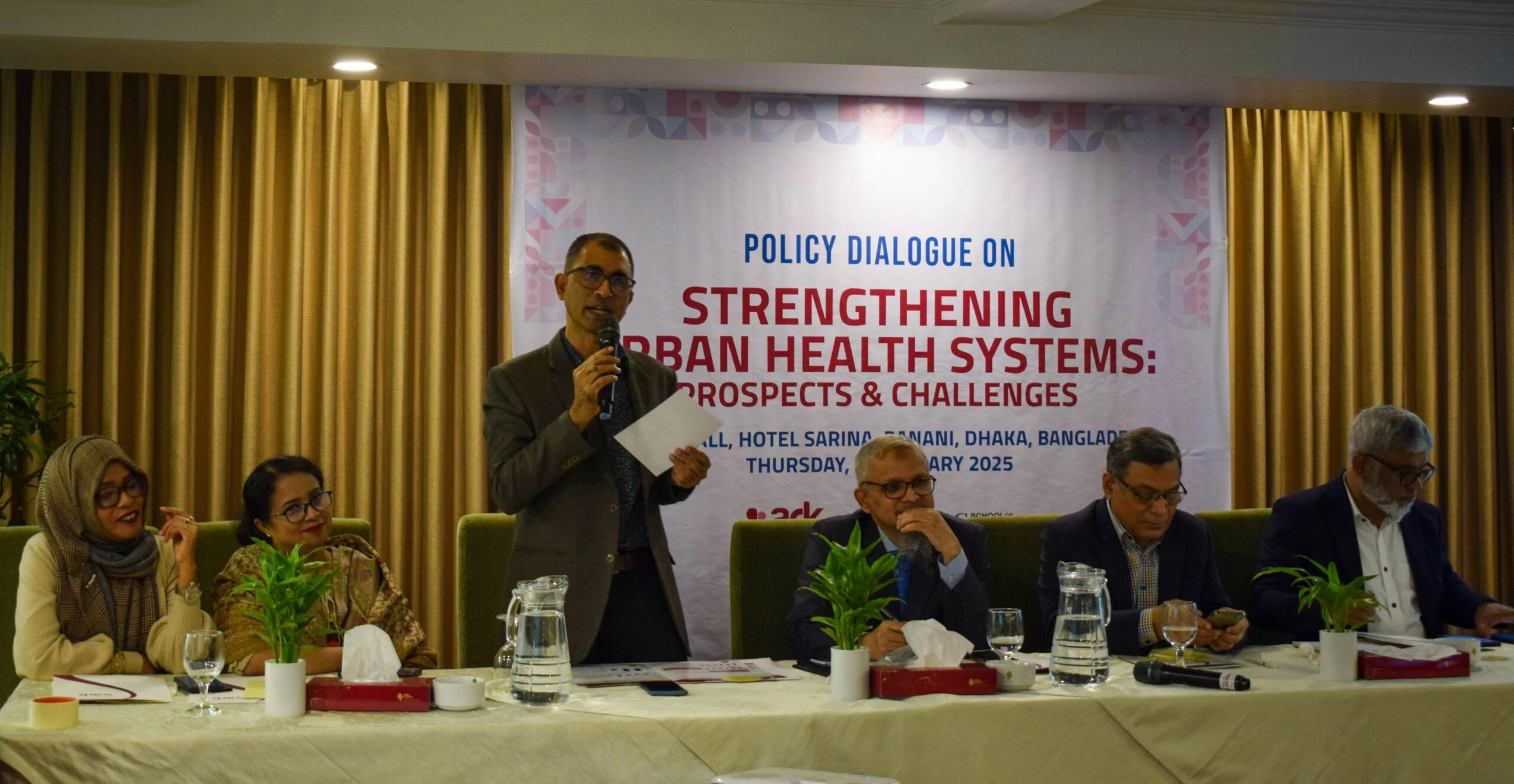
CHORUS Policy Dialogue Event: Strengthening Urban Health Systems – Prospects & Challenges
On 30th January 2025, policy makers, development partners, health experts and researchers came together to discuss priorities and challenges faced when working to strengthen urban health systems, and providing primary healthcare services for all urban residents.
The Policy Dialogue event was held in Dhaka, Bangladesh and was hosted by the ARK Foundation, supported by the Foreign, Commonwealth and Development Office (FCDO). The event was well attended by key Bangladesh government representatives, including from the Directorate General of Health Services (DGHS), Directorate General of Medical Education, Ministry of Health and Family Welfare (MoHFW), North and South City Corporations of Dhaka, and the Ministry of Local Government, Rural Development and Cooperatives (MoLGRDC).
The event extended the strong collaboration between CHORUS researchers and policy makers in Bangladesh, and facilitated an open dialogue on how to address a complex range of urban health system challenges, both in Bangladesh and other resource poor urban settings. Discussions focused on urban healthcare governance, coordination challenges, private and informal sector engagement, financial and human resource constraints, and gaps in health information systems. It also provided an opportunity to share research findings from CHORUS and the implications these have for urban health system policy and practice.
Individual speeches were followed with a rich panel discussion and open floor, during which insights and recommendations were shared on the gaps and opportunities for strengthening the urban health system in Bangladesh, with commonalities and relevance in other low resource settings. These included:
Clarity on the governance of urban health provision is essential for urban health reforms. Without clear roles and responsibilities, urban healthcare remains fragmented and inefficient.
Urban health governance currently is ‘suffering from excessive coordination without clear direction’ (Dr. Abu Hussain Md. Moinul, Director of Hospitals, DGHS). Local government lacks the autonomy and resources needed and there is a fragmented network of providers all operating independently. A single authority is required to take responsibility for ensuring an effective urban healthcare system. As policy implementation remains a challenge, stronger leadership and accountability would ensure policies are not just formulated but effectively implemented.
Inter-ministerial collaboration must be strengthened.
For example, in Bangladesh, the Ministry of Health and Family Welfare (MoHFW) and the Ministry of Local Government, Rural Development & Cooperatives (MoLGRDC) must work together to streamline service delivery. Without structured collaboration between the departments, urban healthcare services would continue to be fragmented and inadequately resourced. A cross-ministerial taskforce would be beneficial for streamlined policies and data sharing.
Health Information Systems (HIS) must be integrated across all providers.
‘Data is the glue that holds the health system’ (Holly Gray, FCDO), however currently, ‘NCD data is neither systematically recorded nor integrated into the national health database, making urban health planning and resource allocation inefficient.’ (Rumana Huque, ARK Foundation). A centralised digital record system and National Health ID would improve evidence based urban health planning and effective budgeting, with private and NGO providers sharing data for inclusion in the centralised data system. Through extending the DHIS2 dashboard, there is an opportunity to bring all agencies within the routine health information system.
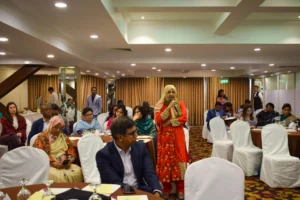
A study across city corporations and municipalities found that 86% of critical health positions remain unfilled, with many urban areas lacking dedicated health personnel. Urgent recruitment, training, and standardized medical protocols across municipalities, and urban-specific medical education programmes are critical to strengthening the workforce.
Public-Private Partnerships (PPPs) need structured governance.
With up to 80% of urban health services in Dhaka currently provided by private providers, formalized agreements and a structured public-private partnership model will improve equity in service delivery and enhance quality and accountability.
Urban areas have active informal health sectors
Greater research is needed to understand the diverse operations of this sector, and explore approaches on how to work with informal providers and incorporate the sector into the health system to improve the quality of the services.
The urban primary healthcare infrastructure must be expanded.
The government should allocate funding for PHC centres in every urban ward and reintroduce urban dispensaries to ensure healthcare accessibility. Rethinking outreach in the context of urban working lives is needed. Women and men in the urban contexts have long working hours, making access to providers challenging due to restricted opening hours, and the traditional home-visit model inappropriate.
Urban health systems need a structured referral system.
Patients should be directed through primary, secondary, and tertiary healthcare levels to prevent the overburdening of hospitals. As noted by Dr. Kamrul Islam (Director of Primary Healthcare, DGHS), rural areas in Bangladesh follow a tiered referral model, however urban centres currently lack such structure, leaving many PHC facilities underutilised
Financial protection for urban populations must be prioritized.
Increased government funding and subsidized NCD medication programmes can reduce out-of-pocket healthcare costs. Dr. Sushil Baral (HERD International) highlights the devastating impact of high out-of-pocket
Urban planning must integrate healthcare considerations.
‘So many factors that affect health exist beyond the health sector’ (Holly Gray, FCDO). We need to integrate health considerations in urban development policies across all sectors, so that health is a key focus for example in transport and housing.
CHORUS is working across four countries (Bangladesh, Ghana, Nepal and Nigeria) to explore the growing challenges facing the urban poor, and to co-develop interventions to address these complex issues. We work closely with policymakers, development partners, and health experts to unpack the nuances of health challenges and to ensure that solutions are equitable, sustainable and scalable. To introduce our approach and findings from across the different contexts, and the implications for policy, we prepared the below video for policy makers and development partners attending the Policy Dialogue event.
You can also read our Policy Brief on Strengthening Urban Health Systems through Public-Private Partnership: Lessons from Four Countries
Read the full report on the Policy Dialogue here.
